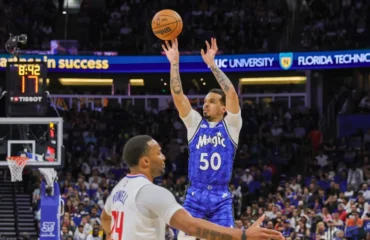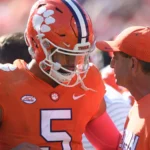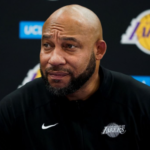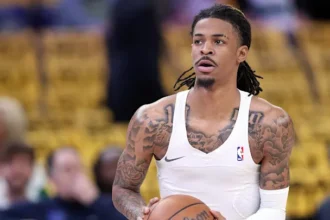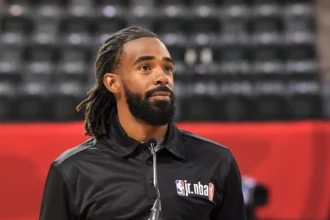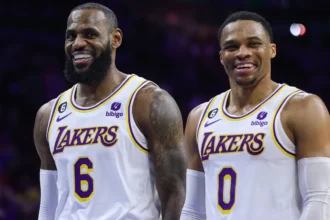The Orlando Magic entered the offseason with high expectations, with at least $30 million in cap space to work with. Fans quickly began dreaming of big-name signings, imagining the possibility of landing All-Stars like Paul George or Klay Thompson, or making major trades.
However, those hoping for a major free agency splash might have been slightly disappointed. The team’s most significant move was a three-year, $66-million contract for Kentavious Caldwell-Pope, along with re-signing several of their own free agents.
Caldwell-Pope’s addition is notable, as he brings strong shooting, defense, and starting experience to the roster. His impact, along with the departure of Markelle Fultz and other key locker room players, will certainly reshape the team.
Yet, this wasn’t the blockbuster offseason many had envisioned. The Magic took a more conservative approach, leaving some gaps still unaddressed.
Despite this, most NBA analysts see the Magic’s summer as a success. They applaud the team’s careful management following their playoff appearance, particularly in maintaining a clear path for Paolo Banchero and Franz Wagner’s development.
Additionally, the Magic have improved their financial flexibility for future trades, setting the stage for the next phase of their rebuild. While major trades aren’t likely before the season starts, the team is now in a better position to be active at the trade deadline or when they encounter obstacles in their push up the standings.
There’s still much to be determined on the court, but the Magic have positioned themselves well for the future.
How the Magic constructed their offseason
The Orlando Magic approached their offseason with a focus on strategic spending rather than splurging recklessly. They made some savvy financial moves, leaving their room mid-level exception, worth about $8 million, untouched for potential future use, although it seems unlikely they’ll utilize it immediately.
The Magic entered the offseason with $49.6 million in cap space, which included Tristan da Silva’s rookie contract and a few remaining cap holds. They quickly allocated nearly half of that by signing Kentavious Caldwell-Pope, whose first-year salary is $20.9 million. This move brought them to the salary cap line, and they are now positioned to remain above it for the foreseeable future.
The rest of the offseason was spent crafting contracts that provide flexibility for future trades. Orlando signed Goga Bitadze to a three-year, $25-million deal, with a reasonable $9.1 million in the first year. Gary Harris agreed to a two-year, $15-million deal, earning $7.5 million in the first year and waiving his implicit no-trade clause. Similarly, Moe Wagner signed a two-year, $22-million deal, with $11 million in the first year, also waiving his no-trade clause.
Additionally, the extension of Jonathan Isaac’s contract increases his salary to $25 million this year, but it will decrease to $15 million by 2026, giving the Magic significant future flexibility.
These contracts are largely movable, providing Orlando with valuable trade assets. The team’s depth has also improved, with young talents like Jett Howard, Tristan da Silva, and Anthony Black vying for playing time—something they lacked last season.
Though the Magic are now over the salary cap, their offseason strategy suggests they are far from finished in shaping the roster for future success.
The Magic’s cap sheet sets them up better for trades
It’s hard to label the Orlando Magic as the league’s darling just yet, but they have certainly become one of its more intriguing teams.
There’s still some debate about the ultimate potential of Paolo Banchero and Franz Wagner, but the consensus is that the Magic will remain competitive and stay in the playoff conversation.
Many around the league see the Magic as a sleeping giant, potentially just one move away from becoming serious contenders. The praise for their offseason has largely focused on their restraint and how they’ve positioned themselves for future success.
However, it’s also widely acknowledged that the Magic’s roster is still incomplete. The team’s future hinges on Banchero and Wagner continuing their development and ascending to stardom. The Magic’s success ultimately rests on these two young players.
Most analysts believe Banchero and Wagner will continue to make strides, though questions remain. Concerns persist about Wagner’s shooting, and there’s ongoing debate about Banchero’s ceiling. His style of play suggests he needs to be among the elite for the Magic to thrive.
The Magic will need additional help soon, and everyone recognizes this—even Banchero’s agent, Mike Miller, mentioned it on a recent episode of The O.G.’s. The key question is identifying the right player to pursue.
While there are some intriguing early trade options, the perfect target has yet to emerge. Last season, the Magic struggled to leverage their assets into a major trade, assuming that was even a priority.
Jeff Weltman is betting on continuity, but he knows that continuity only works if the team is successful. The Magic will face setbacks on their journey to contention, and new players will be needed along the way. Fortunately, they are now better positioned to make those necessary additions.
For example, the Magic could package Cole Anthony ($12.9 million) and Gary Harris ($7.5 million) to create $20.4 million in trade value, enough to make a move for someone like Collin Sexton ($18.4 million), a popular target in trade discussions. They have various other combinations available to reach that figure as well. This flexibility allows Orlando to pursue impactful trades without sacrificing depth.
While the Magic might not yet be ready for an all-in trade, everyone sees it on the horizon. The players currently on the market may not be the right fit just yet, but the Magic are in a position to patiently wait for the ideal opportunity.
With their current contracts and full stockpile of draft picks, the Magic are closer to making that “all-in” move. They just need to evaluate their on-court performance and determine the type of player they should target.
For now, the Magic are gathering information on their team and waiting for the right player to come along. But that significant trade is on the way—it’s the next step in Orlando’s path to improvement.
This phase of the Magic’s rebuild is complete. They’ve spent their cap space wisely, setting the stage for what comes next—once they determine the best course forward.
